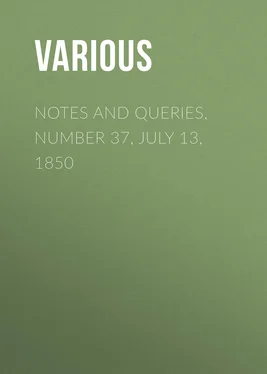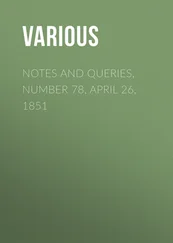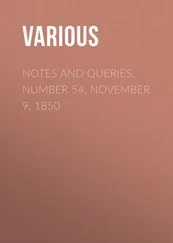Various - Notes and Queries, Number 37, July 13, 1850
Здесь есть возможность читать онлайн «Various - Notes and Queries, Number 37, July 13, 1850» — ознакомительный отрывок электронной книги совершенно бесплатно, а после прочтения отрывка купить полную версию. В некоторых случаях можно слушать аудио, скачать через торрент в формате fb2 и присутствует краткое содержание. Жанр: foreign_antique, periodic, foreign_edu, на английском языке. Описание произведения, (предисловие) а так же отзывы посетителей доступны на портале библиотеки ЛибКат.
- Название:Notes and Queries, Number 37, July 13, 1850
- Автор:
- Жанр:
- Год:неизвестен
- ISBN:нет данных
- Рейтинг книги:5 / 5. Голосов: 1
-
Избранное:Добавить в избранное
- Отзывы:
-
Ваша оценка:
- 100
- 1
- 2
- 3
- 4
- 5
Notes and Queries, Number 37, July 13, 1850: краткое содержание, описание и аннотация
Предлагаем к чтению аннотацию, описание, краткое содержание или предисловие (зависит от того, что написал сам автор книги «Notes and Queries, Number 37, July 13, 1850»). Если вы не нашли необходимую информацию о книге — напишите в комментариях, мы постараемся отыскать её.
Notes and Queries, Number 37, July 13, 1850 — читать онлайн ознакомительный отрывок
Ниже представлен текст книги, разбитый по страницам. Система сохранения места последней прочитанной страницы, позволяет с удобством читать онлайн бесплатно книгу «Notes and Queries, Number 37, July 13, 1850», без необходимости каждый раз заново искать на чём Вы остановились. Поставьте закладку, и сможете в любой момент перейти на страницу, на которой закончили чтение.
Интервал:
Закладка:
The proper or appointed place for keeping hoggis was Hoggistone, now Hoxton; as Houndsditch 2 2 Mr. Cunningham, speaking of Houndsditch, merely quotes the words of Stow. It would appear that Stow's reason for the name is entirely conjectural; and indeed the same reason would justify the same name being applied to all the "ditches" in London in the year 1500, and indeed much later. This passage of Arnold throws a new light upon the name , at least, of that rivulet; for stagnant its waters could not be, from its inclination to the horizon. It, however, raises another question respecting the mode of keeping and feeding hounds in those days; and likewise, as suggested in the text, the further question, as to the purpose for which these hounds were thus kept as a part of the civic establishment.
was for the hounds.
There is another among these petitions to the Lord Mayor and corporation, worthy of notice, in connection with sanatory law.
"Also in avoydîg ye abhomynable savours causid by ye kepîg of ye kenell in ye mote and ye diches there, and î especiall by sethig of ye houndes mete wt roten bones, and vnclenly keping of ye hoûdes, wherof moche people is anoyed, soo yt when the wynde is in any poyte of the northe, all the fowle stynke is blowen ouer the citee. Plese it mi Lord Mair, Aldirmen, and Comen Coûcell, to ordeigne that the sayd kenell be amoued and sett in sô other côuenient place where as best shall seme them. And also that the said diches mai be clensed from yere to yere, and so kepte yt thereof folowe non annoyaunce."—p. 87.
Of course "Houndsditch" is here meant; but for what purpose were the hounds kept? And, indeed, what kind of hounds were they, that thus formed a part of the City establishment? Were they bloodhounds for tracking criminals, or hounds kept for the special behoof and pleasure of the "Lord Mair, Aldermen, and Comen Coûsel?" The Houndsditch of that time bore a strong resemblance to the Fleet ditch of times scarcely exceeding the memory of many living men.
I come now to the passages relating to the clergy.
"Also, where as the curatis of the cyte have used often tyme herebefore to selle their offring (at mariag), whereby the pisshês where such sales be made comenly be lettid fro messe or matyns, and otherwhiles from both, by so moch as the frendis of the pties maryed vsen to goo abowte vij. or viij. dayes before, and desiryg men to offryg at such tymes as more conuenyent it were to be at diunyne seruice. Plese it my Lord Mair, Aldirmê, and Comê Coûseile, to puide remedy, so that the sayd custume be fordone and leid aparte."—p. 86.
"Also, to thentent that the ordre of priesthood be had in dew reuerence according to the dignite therof, and that none occasions of incontinence growe bee the famylyarite of seculer people. Plese it my Lord Mayre, Aldirmen, and Comon Counsyll, to enacte that no maner persone beyng free of this citee take, receyue, and kepe from hensforth ony priest in comons, or to borde by the weke, moneth, or yere, or ony other terme more or lesse, vpon peine thervpon to be lymytyd, prouided that this acte extêde not to ony prieste retayned wyth a citezen in famyliar housolde."—p. 89.
"Also, plese it my Lord Mayre, Aldyrmen, and Comon Counseylle, that a communication may be had wyth the curatis of this citee for oblacions whiche they clayme to haue of citezens agaynst the tenour of the bulle purchased att their owne instance, and that it may be determined and an ende taken, whervpon the citezens shall rest."—p. 89.
"Also, yf ther be ony priest in seruice within the warde, which afore tyme hath been sette in the toune in Cornhyll for his dishoneste, and hath forsworne the cyte, alle suche shulde bee presentyd."—p. 92.
Upon these I shall make no remark. They will make different impressions on different readers; according to the extent of prejudice or liberality existing in different minds. They show that even during the most absolute period of ecclesiastical domination, there was one spot in England where attempts to legislate for the priesthood (though perhaps feeble enough) were made. The legislative powers of the corporation were at that time very ample; and the only condition by which they appear to have been limited was, that they should not override an act of parliament or a royal proclamation.
Is there any specific account of the "tonne in Cornhyll" existing? Its purpose, in connection with the conduit, admits of no doubt; the forsworn and dishonest priest had been punished with a "good ducking," and this, no doubt, accompanied with a suitable ceremonial for the special amusement of the "'prentices." 3 3 This view will no doubt be contested on the authority of Stow, who describes the tonne as a "prison for night-walkers," so called from the form in which it was built. (Cunningham, p. 141., 2nd ed.) Yet, as Mr. Cunningham elsewhere states (p. xxxix.), "the Tun upon Corn-hill [was] converted into a conduit" in 1401, it would hardly be called a "prison" a century later. The probability is, that the especial building called the tonne never was a prison at all; but that the prison, from standing near or adjoining the tonne, took its name, the tonne prison, in conformity with universal usage. It is equally probable that the tonne was originally built for the purpose to which it was ultimately applied; and that some delay arose in its use from the difficulty experienced in the hydraulic part of the undertaking, which was only overcome in 1401. The universality of the punishment of "ducking" amongst our ancestors is at least a circumstance in favour of the view taken in the text.
I have also marked a few passages relative to the police and the fiscal laws of those days, and when time permits, will transcribe them for you, if you deem them worthy of being laid before your readers.
T.S.D.FOLK LORE
Midsummer Fires. —From your notice of Mr. Haslam's account of the Beltein or Midsummer fires in Cornwall, I conclude you will give a place to the following note. On St. John's eve last past, I happened to pass the day at a house situate on an elevated tract in the county of Kilkenny, Ireland; and I shall long remember the beauty of the sight, when, as dusk closed in, fire after fire shot up its clear flame, thickly studding the near plains and distant hills. The evening was calm and still, and the mingled shouts and yells of the representatives of the old fire-worshippers came with a very singular effect on the ear. When a boy, I have often passed through
Конец ознакомительного фрагмента.
Текст предоставлен ООО «ЛитРес».
Прочитайте эту книгу целиком, купив полную легальную версию на ЛитРес.
Безопасно оплатить книгу можно банковской картой Visa, MasterCard, Maestro, со счета мобильного телефона, с платежного терминала, в салоне МТС или Связной, через PayPal, WebMoney, Яндекс.Деньги, QIWI Кошелек, бонусными картами или другим удобным Вам способом.
1
Two of these—one a letter asking the earl to stand godfather to his son, and the other a short note, forwarding a book (Qy. of Toland's)—are printed by Sir Henry Ellis in his Camden volume, Letters of Eminent Literary Men .—ED.
2
Mr. Cunningham, speaking of Houndsditch, merely quotes the words of Stow. It would appear that Stow's reason for the name is entirely conjectural; and indeed the same reason would justify the same name being applied to all the "ditches" in London in the year 1500, and indeed much later. This passage of Arnold throws a new light upon the name , at least, of that rivulet; for stagnant its waters could not be, from its inclination to the horizon. It, however, raises another question respecting the mode of keeping and feeding hounds in those days; and likewise, as suggested in the text, the further question, as to the purpose for which these hounds were thus kept as a part of the civic establishment.
Читать дальшеИнтервал:
Закладка:
Похожие книги на «Notes and Queries, Number 37, July 13, 1850»
Представляем Вашему вниманию похожие книги на «Notes and Queries, Number 37, July 13, 1850» списком для выбора. Мы отобрали схожую по названию и смыслу литературу в надежде предоставить читателям больше вариантов отыскать новые, интересные, ещё непрочитанные произведения.
Обсуждение, отзывы о книге «Notes and Queries, Number 37, July 13, 1850» и просто собственные мнения читателей. Оставьте ваши комментарии, напишите, что Вы думаете о произведении, его смысле или главных героях. Укажите что конкретно понравилось, а что нет, и почему Вы так считаете.












